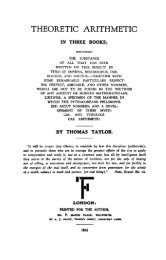Perl - The Good of the Intellect.pdf - Platonic Philosophy
Perl - The Good of the Intellect.pdf - Platonic Philosophy
Perl - The Good of the Intellect.pdf - Platonic Philosophy
You also want an ePaper? Increase the reach of your titles
YUMPU automatically turns print PDFs into web optimized ePapers that Google loves.
<strong>The</strong> <strong>Good</strong> <strong>of</strong> <strong>the</strong> <strong>Intellect</strong> 27<br />
on <strong>the</strong> journey toward <strong>the</strong> One, toward ecstasy. . . . This is a unique case <strong>of</strong> an intellectualism<br />
that demands <strong>the</strong> mystical flight <strong>of</strong> <strong>the</strong> soul.” 7 Though we may question<br />
<strong>the</strong> claim <strong>of</strong> uniqueness, since such a view can be found throughout <strong>the</strong> Greek and<br />
medieval intellectualist tradition, this is an apt description <strong>of</strong> Plotinus that sets him<br />
apart from today’s attempts to dispense with intellect and <strong>the</strong> intelligible. In what<br />
follows I propose to show, by working out how Plotinus’ understanding <strong>of</strong> intellect<br />
differs from modern presuppositions, how he achieves this.<br />
I. <strong>The</strong> Denial <strong>of</strong> <strong>Intellect</strong>ual Intuition<br />
<strong>The</strong> reasons for <strong>the</strong> contemporary dismissal <strong>of</strong> intellect reach far back in <strong>the</strong><br />
history <strong>of</strong> modern philosophy. Since at least <strong>the</strong> time <strong>of</strong> Kant it has been generally<br />
taken for granted that <strong>the</strong>re can be no intellectual intuition. We need look no fur<strong>the</strong>r<br />
than <strong>the</strong> opening lines <strong>of</strong> <strong>the</strong> Transcendental Aes<strong>the</strong>tic:<br />
In whatever manner and by whatever means a mode <strong>of</strong> knowledge may<br />
relate to objects, intuition is that through which it is in immediate relation<br />
to <strong>the</strong>m. . . . But intuition takes place only in so far as <strong>the</strong> object is<br />
given to us. This again is only possible, to man at least, in so far as <strong>the</strong><br />
mind is affected in a certain way. <strong>The</strong> capacity (receptivity) for receiving<br />
representations through <strong>the</strong> mode in which we are affected by objects, is<br />
entitled sensibility. Objects are given to us by means <strong>of</strong> sensibility, and it<br />
alone yields us intuitions. . . . [A]ll thought must, directly or indirectly<br />
. . . relate ultimately to intuitions, and <strong>the</strong>refore, with us, to sensibility,<br />
because in no o<strong>the</strong>r way can an object be given to us. 8<br />
“Intuition,” we should note, translates Anschauung, and thus invokes <strong>the</strong> paradigm<br />
<strong>of</strong> “beholding,” “seeing,” to characterize <strong>the</strong> immediacy <strong>of</strong> what is thus given to<br />
awareness. <strong>The</strong> assumption, <strong>the</strong>refore, is that only by way <strong>of</strong> sense, and hence, as<br />
Kant goes on to argue, only in time, is any content immediately present to awareness.<br />
For Heidegger, <strong>of</strong> course, temporality is so fundamental to our awareness that<br />
he can assert, “[T]ime is Dasein . . . Dasein is time.” 9 And in our own time Jean-Luc<br />
Marion, describing <strong>the</strong> intrinsic contingency <strong>of</strong> every phenomenon as a pure given,<br />
remarks dismissively, “For <strong>the</strong> rest—<strong>of</strong> what importance to us is angelic or divine<br />
understanding?” 10 Marion goes on to observe that even if <strong>the</strong>re are principles, e.g.,<br />
ma<strong>the</strong>matical truths, that are strictly nontemporal in <strong>the</strong>mselves, <strong>the</strong>y are always given<br />
to us in time, at a particular point in time: “No doubt, one can speak rigorously <strong>of</strong><br />
a nontemporality <strong>of</strong> ideals. . . . <strong>The</strong> fact remains that none <strong>of</strong> <strong>the</strong>m has ever been<br />
known except by this or that, that is to say, in a time, a place, and precise circumstances.<br />
<strong>The</strong> ideals can indeed, if one sticks just to <strong>the</strong> ideal, remain for eternity, but<br />
in fact <strong>the</strong>ir apparition . . . is always inscribed in a time and place. . . . Ideality does<br />
not perhaps possess facticity, but its appearance does. For me . . . <strong>the</strong> ideals impose<br />
<strong>the</strong>mselves in precise times and places.” 11 Here again we find <strong>the</strong> unsupported<br />
assumption—unsupported because in <strong>the</strong> contemporary context it can be taken for<br />
granted—that even if <strong>the</strong>re is timeless reality <strong>the</strong>re is no timeless awareness <strong>of</strong> it,
















